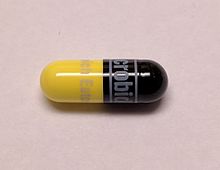

If you are prone to recurrent UTIs-meaning you get two or more in six months or three or more in a year-your doctor might prescribe nitrofurantoin in a smaller dose over a longer period of time to prevent UTIs. A UTI is considered uncomplicated if someone has no urinary tract abnormalities or underlying health issues. Nitrofurantoin is primarily prescribed to treat uncomplicated lower urinary tract infections. Kidney infections can be treated with antibiotics but in severe cases may require a trip to the hospital to prevent permanent organ damage or renal failure.


Symptoms include nausea, fever, body chills, and lower back or side pain. Upper UTIs usually result from untreated lower UTIs that spread upward to the kidneys.

After taking it for several days in a row, UTI symptoms will start to subside. Nitrofurantoin serves one primary and important purpose: to kill the bacteria that cause UTIs. Get started What Is Nitrofurantoin Used For? Consult official guidance on the appropriate use of antibiotics when prescribing nitrofurantoin.Chat with a doctor and get UTI antibiotics for just $35.Closely monitor for signs of pulmonary, hepatic, neurological, haematological, and gastrointestinal side effects during treatment, as previously advised in the summary of product characteristics (see below).Consider checking renal function when choosing to treat with nitrofurantoin, especially in the elderly.Only prescribe to such patients to treat lower urinary tract infection with suspected or proven multidrug resistant pathogens when the benefits of nitrofurantoin are considered to outweigh the risks of side effects. A short course (3 to 7 days) may be used with caution in certain patients with an eGFR of 30 to 44 ml/min/1.73m 2.Nitrofurantoin should not be used to treat sepsis syndrome secondary to urinary tract infection or suspected upper urinary tract infections.Nitrofurantoin is contraindicated in patients with an estimated glomerular filtration rate (eGFR) of less than 45 ml/min/1.73m 2.We remind you that antibiotic treatment of asymptomatic bacteriuria is not advised except during pregnancy and other special circumstances. We concluded that the existing contraindication is no longer supported and that the available evidence justified a revised contraindication against use in patients with an eGFR of less than 45 ml/min/1.73m 2. We also considered the risk of Clostridium difficile colitis associated with the widespread use of alternative broad-spectrum antibiotics (cephalosporins and flouroquinolones). We have reviewed the evidence for this contraindication in the context of increasing antibiotic resistance of lower urinary tract pathogens to standard therapy (trimethoprim and amoxicillin). Nitrofurantoin was previously contraindicated in patients with a creatinine clearance of less than 60 ml/min. This may reduce the antibacterial efficacy, increase the risk of side effects (eg, nausea, vomiting, loss of appetite), and may result in treatment failures. In patients with renal impairment, renal secretion of nitrofurantoin is reduced. The antibacterial efficacy in this infection depends on the renal secretion of nitrofurantoin into the urinary tract. Nitrofurantoin is an oral antibiotic for the treatment and prevention of urinary tract infections.


 0 kommentar(er)
0 kommentar(er)
